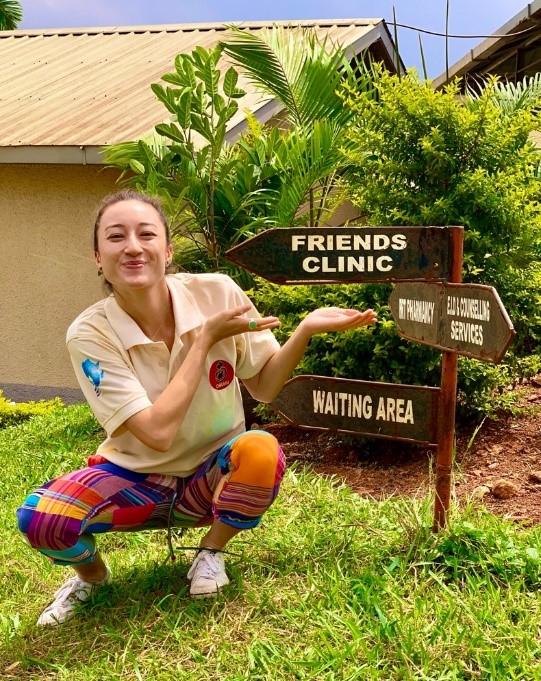April 29, 2021
Research Assistant Michelle Bulterys selected for UW CFAR STD/AIDS Research Training Fellowship in Epidemiology

Michelle Bulterys spent the summer of 2019 conducting fieldwork at the antenatal care research site in Kampala, Uganda.
Michelle Bulterys, first year PhD student in the Department of Epidemiology, Global WACh research assistant, and the 2020 Recipient of the UW School of Public Health’s Gilbert S. Omenn Award for Academic Achievement, was recently selected for a prestigious predoctoral fellowship which will support the remaining three years of her doctoral training. The UW Center for AIDS and STD (CFAR)’s STD/AIDS Research Training Fellowship Program is an NIH-supported T32 training grant, directed by Drs. Anna Wald and Sheila Lukehart. The Program aims to train the next generation of leaders in STD and AIDS research.
Michelle grew up in Zambia when the country had among the world’s highest HIV burdens; her early experiences starting a youth soccer program with her teammates who were living with HIV, volunteering in HIV clinics, pediatric malnutrition wards and orphanages instilled in her a clear determination to pursue an academic research career focused on preventing HIV/AIDS in children. Prior to starting her MPH in Epidemiology at UW in 2018, Michelle studied anthropology and global health in university, studied abroad in South Africa, and gained practical research experience at the Stanford School of Medicine, Joint United Nations AIDS Program (UNAIDS), Foundation for Innovative New Diagnostics in Switzerland, and PATH.
Since September 2018, Michelle has supported several East Africa-based research projects led by Drs. Connie Celum and Grace John-Stewart within UW’s International Clinical Research Center (ICRC) and Global WACh, respectively. Two large studies, the Obumu Study (PI: Celum) and HOPE Study (PI: John-Stewart) will serve as the foundation on which Michelle’s dissertation will build.
Over the last three years, Michelle worked as a research assistant on the Obumu Study, a randomized trial in Uganda assessing whether secondary distribution of HIV self-testing kits from pregnant women living with HIV to their untested partners improves testing uptake and post-partum virologic suppression compared to using standard invitation letters. Michelle spent the summer of 2019 conducting fieldwork at the study’s site, a public antenatal care clinic in Kampala, Uganda. Michelle conducted epidemiologic, qualitative, and costing analyses under Dr. Celum’s direction; the findings of which have been published in academic journals and presented at conferences (see a featured list below).
Michelle currently works as a research assistant on the HOPE Study, a Kenya-based longitudinal cohort comparing health outcomes between HIV-exposed-uninfected children (HEU) with HIV-unexposed-uninfected children. Michelle supports data management, analyses and reporting, as well as study coordination activities. Two thousand mother-infant pairs in this study will be followed for the next several years to collect data on the impact of HIV and treatment exposure on child growth, neurodevelopment, and several other health outcomes.
The T32 Fellowship will support Michelle’s dissertation work, which will leverage data from these two studies to identify predictors of maternal virologic suppression and HEU child neurodevelopment over time. Additionally, Michelle plans to lead a qualitative research question within the HOPE study to gather perspectives from caregivers on HEU child neurodevelopmental delays: recognition of signs and symptoms, perceived attribution of delays, the point at which help is sought or considered, and health-seeking behaviors. Michelle is also working closely with her mentors at UNAIDS to analyze the 2021 global HEU estimates to identify important characteristics, trends, and locations of HEU populations. Collectively, Michelle’s dissertation hopes to combine multidisciplinary methods to recommend targeted, sustainable, and culturally appropriate interventions that improve quality of life for this rapidly growing population of HIV-exposed-uninfected children.
Michelle will continue to be mentored by her dissertation committee: Drs. Grace John-Stewart, Connie Celum, Anjuli Wagner, Irene Njuguna, Monisha Sharma, and Jim Hughes. We congratulate Michelle on her achievements and look forward to keeping up with her work.
Research Highlights
- Bulterys MA, Sharma M, Celum C, et al. “Correlates of HIV status non-disclosure by pregnant women living with HIV to their male partners in Uganda: a cross-sectional study”. JAIDS. 2020. PMID: 33148995.
- Bulterys MA, Celum C, Sharma M, et al. “Costs of providing HIV self-testing kits to pregnant women living with HIV in Uganda for secondary distribution to male partners”. Diagnostics. 2020;10(5), 318.
- Velloza J, Khoza N, Bulterys MA, et al. “The influence of HIV-related stigma on PrEP disclosure and adherence among adolescent girls and young women”. J Int AIDS Society, 2020;23(3):e25463.
- Bulterys MA et al. “Male perspectives on HIV self-testing distribution strategies: a qualitative study”. 23rd International AIDS Conference (AIDS 2020: Virtual), poster exhibition; 2020.
- Neary J, Bulterys MA, et al. “Pediatric saliva-based HIV testing: acceptability of home-based and parent-administered tests”. 23rd International AIDS Conference (AIDS 2020: Virtual) poster exhibition; 2020.
- Bulterys MA. “The cost of secondary distribution of HIV self-testing kits by pregnant women living with HIV to increase uptake of male partner testing in Uganda”. UW MPH Symposium, USA, 2020. *Oral
- Bulterys MA. “Couples’ perspectives on secondary distribution of HIV self-testing kits by pregnant women living with HIV to increase uptake of male partner testing in Uganda”. UW Ignite Talks, USA, 2020. *Oral
- Bulterys MA. “The impact of support groups in a PMTCT setting on disclosure of HIV status and secondary distribution of HIV self-testing kits by pregnant women to their male partners in Uganda”. Center for AIDS Research HIV and STD Symposium, UW, USA, 2019. *Poster